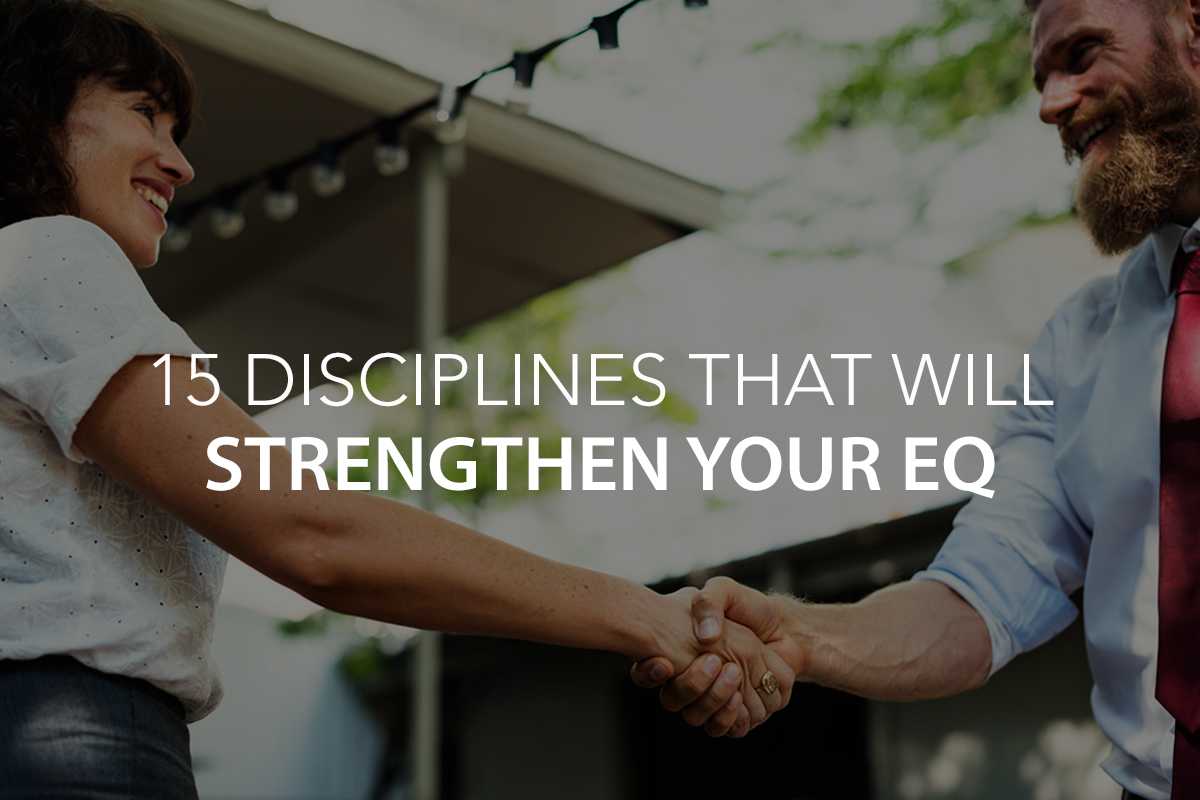I’ve never heard of a person failing or being held back because he or she is too emotionally intelligent! But I have watched many fail or not reach their potential because they were bordering on clueless when it came to relating to others. There are a variety of great books and articles on the topic, but sometimes practical suggestions are in short supply. Here are 15 disciplines each of us can use to strengthen our emotional and relational intelligence.
1. Initiate a meal
At least one day each week enjoy a meal with someone different than your normal network. You are never too busy to do this once per week! And, meals often have a way of setting people at ease.
2. Ask questions
Practice asking at least two questions of every person you meet. Questions show interest and may include their weekend activities, family, special events, or important projects.
3. Pursue connection
Seek time with those above you and those below you in the organizational hierarchy. It’s most natural to spend time with peers. Break it up and initiate time with supervisors and subordinates as well as people in departments unrelated to yours.
4. Watch others
Identify one or two people who are great relaters and learn. This is a great way to strengthen your EQ. You should not try to be just like them, but you can learn what they do well and what would fit with who you are.
5. Ask for feedback
Find a few trusted and truthful friends and periodically ask them for feedback on your relational style. We cannot grow or learn about much of anything, including emotional intelligence, without input from other sources.
6. Be transparent
Transparency helps form stronger emotional connections to others. However, transparency requires discernment since sharing too much personal information or asking too personal of a question with someone you only know casually can reflect really poor emotional intelligence rather than build it!
7. Read
Select a good book or a few articles on building emotional and relational strength. Dr. Travis Bradberry and Dr. Daniel Goleman are just a few writers worth reading on the topic of Emotional Intelligence along with Dr. Dave Marks' article "Making Relational Glue" found in The Center's book FIT – Improving the Leadership Health of Yourself and Others.
8. Affirm
Intentionally find a way to offer affirmation to each person with whom you interact. Affirmation, when genuine, can build trust and a relational bond with others.
9. Plan
For some people, it is helpful to think about the person and conversation in advance of having it. This is especially true if you do not feel confident in your management of emotional and relational interactions.
10. Send a note or email
Taking the time to send a positive note to someone reinforces your attention to strengthening your EQ, and the person will appreciate it. Some people find they can express themselves better in writing than in a face-to-face meeting, and people find encouraging notes to be… encouraging!
11. Monitor intensity and tone
People who are good at building vibrant relationships pay attention to how they are speaking, the volume at which they are speaking, and the body language they are manifesting when they are speaking.
12. Smile more
Yes, something as simple as a smile can make us more inviting and less intimidating. This is another reminder that our non-verbal language is as powerful as what we say with words.
13. Focus
Not on your phone or on the surrounding distractions! Focus on the person in front of you and do everything within your power to not lose that focus. Eliminate as many distractions as possible.
14. Walk around
Sitting too long at your desk is not only not physically healthy, it is also not relationally healthy. Intentionally walk around to other offices to say hi, check in on how people are doing, and let them know you are interested in more than just the tasks at hand.
15. Reconcile quickly
Conflict is natural and often necessary to forming healthy relationships. But left unresolved, feelings can fester and relational infection can set in causing long-term harm.
We hope these 15 practical suggestions to help strengthen emotional and relational intelligence are beneficial for you. Contact The Center to learn more about how coaching can assist you or another team member in becoming more emotionally intelligent!
Jay Desko is the CEO of The Center Consulting Group and brings experience in the areas of organizational assessment, leadership coaching, decision-making, and strategic questioning. Jay’s degrees include an M.Ed. in Instructional Systems Design from Pennsylvania State University and a Ph.D. in Organizational Behavior and Leadership from The Union Institute.




![Leadership: How to Be a World Class Boss [VIDEO]](https://images.squarespace-cdn.com/content/v1/571fc0ea1d07c0fd6d72c167/1744640489138-X5LUNZT3JTRQYSSZXV1C/boss+thumbnail.png)

